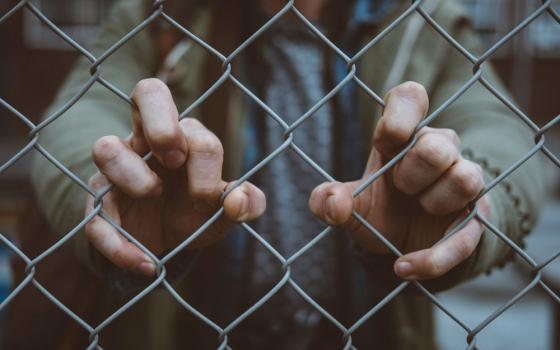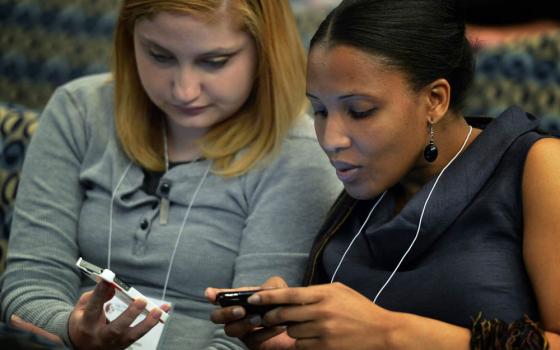The heavy metal door bangs behind me, the electric buzz locks the bolt in place. After a pause, another door buzzes and is unlocked, controlled by a police officer sitting near a video monitor in another room. I cross the florescent-lit linoleum and open the next heavy metal door, making my way through this threshold of security.
It's my first visit inside the county jail. My mind and breath are electric with anticipation. We — the other volunteer I am shadowing and I — arrange the blue plastic chairs in a circle and place copies of Scripture passages, prayers and reflections upon them. Shortly I will encounter my first group of inmates. More than a dozen men will join us for prayer and Bible study.
Driving through brightly colored October woods to the jail, I pondered the sorrowful mysteries. I thought of Jesus praying with agony in the garden, the crowds mocking his crown of thorns. I imagined how heavy the cross must have felt as he carried it, how painful it must have been to be nailed to wooden beams. I considered the mystery of how Jesus united all our suffering together upon that cross, on that holy and awful Good Friday long ago, in order to make us more free.
Two thousand years later, and living in a very different world, how is Christ helping me gain freedom? What freedoms do I lack?
When I taught Scripture in a Catholic high school, my instruction was centered around the one-sentence summary of the Bible that I invented: The people of God are in a loving relationship with God and are on a journey to greater freedom. From September to May, for four years in a row, I mulled over Scripture stories with diverse groups of spirited teenagers and asked them over and over: What does this passage have to say about freedom? Who needs greater freedom in this story? What sort of freedom — freedom from sin, from oppression, freedom to love — is needed for God's people in this section of the Bible?
Sitting in the circle behind layers of locked doors, the men and I attempt to sing a round of the hymn "Soon and Very Soon" in key, a tune that implies that Jesus could walk in any minute and set us all free.
My mind wanders as I look around the circle at the men in their brightly colored cotton tops; the shades of yellow, orange and red that they wear remind me of the bright autumn leaves outside. I want to tell the inmates that they resemble the beauty of the trees, but I decide against it: would such a statement seem a mockery? Would it only provoke the pain of what they are separated from, remind them of what they lack? As I sing I realize that, being with the men in this circle, my own insecurity has surfaced.
Noticing the inmates' focus as we take turns reading prayers and reflections from the photocopies, another thought jolts through me, a thought that amuses me but I also don't say out loud: They are so fortunate to be free from cell phones in here!
Technology ethicist Tristan Harris described how social media is designed to manipulate our habits and time. Harris' TED talk, "How a handful of tech companies control billions of minds everyday," is disturbing, alarming and relevant: "Sometimes the world's most pressing and important problems are not these hypothetical future things that we could create in the future. Sometimes the most pressing problems are the ones that are right underneath our noses, the things that are already directing a billion people's thoughts."
Sometimes the things that control us the most are the things about which we are the least conscious. I'm haunted by the idea that we all may blindly, unknowingly sacrifice our freedoms.
I wonder how much time I spend looking at a screen on an ordinary day, succumbing to the psychological tampering with my mind. It's not new for me to think about technology's influence over human behavior; I have been fascinated by the topic for years.
I resisted using GPS for a long time because "I don't want to obey a robot." I resisted having a smartphone and a laptop for my own use for a good while because "I don't know what power the machines might have over me." Now, as a steady user of these technologies, I know that I must be careful. I set timers for myself. I track my behavior. I have a set of structures in place so that I am a conscious consumer, so I maintain control. Yet, I have sloppy habits and fail frequently. It's awful to admit, but when it comes to technology, I am not free.
Freedom is a major theme throughout Scripture, throughout salvation history. With over 100 verses on the topic, the Bible tells us repeatedly that it is what we're made for, that it's our destiny: "Live as people who are free, not using your freedom as a cover-up for evil, but living as servants of God;" "For freedom Christ set us free; so stand firm and do not submit again to the yoke of slavery."
Inside the jail, the men in the circle ask questions about the meaning of free will and choice. We discuss how it's always harder to do the right thing and behave like a good person than be selfish, how using our freedom to say "yes" to God's love means so much more when we can say "no."
Locked inside the jail for what might be a long time, one of the men speaks from his heart, his tattooed hands moving in passionate gestures. He looks around at all our faces, tells the truth:
"I think it is harder for people on the outside, rich people, to be close to God. They think they have everything, they are not like us, they don't cry out to God for help. We are the lowest of the low locked away in here; we have nothing. We are free."
[Julia Walsh is a Franciscan Sister of Perpetual Adoration, a retreat presenter and a blogger who can be found online at MessyJesusBusiness.com.]


